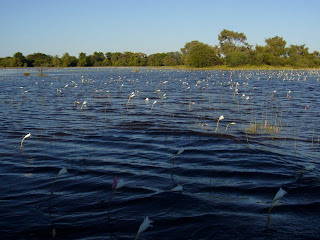The working day starts early. My alarm clock is set for 6.20am, which is roughly the time of sunrise as well. After some snoozing I get up for breakfast, which is usually cereal and fruit. I make some coffee in my little coffee maker, which I managed to hunt down in Maun after a desperate search around town. I wasn't going to bother with coffee, thinking I'd be fine with just tea in the camp, until I panicked at the last minute. I'm quite thankful for it, as the coffee I got from a little fresh produce shop is delicious and it really makes my morning.
If I don't have time to finish my coffee with breakfast, I take it with me in a thermos 'commuter cup'.
 At about 7.30am we head off in Anna's Toyota and the commute begins - only it's just a slightly different commute from what I'm used to in London. We drive across the flood plain (which is getting more and more flooded so we might not be able to drive across for much longer), past the beautiful white water lilies that have popped up everywhere, the grazing cattle and the birds, through the bush, until we finally reach the dirt road.
At about 7.30am we head off in Anna's Toyota and the commute begins - only it's just a slightly different commute from what I'm used to in London. We drive across the flood plain (which is getting more and more flooded so we might not be able to drive across for much longer), past the beautiful white water lilies that have popped up everywhere, the grazing cattle and the birds, through the bush, until we finally reach the dirt road.There we pick up Nature, who is the translator. He speaks English, Setswana, and some other local languages - there are as many of them in this area as there are different tribes.
A typical day in the office might start with a 'transect', when we drive slowly (not that you can go very fast on the dirt road anyway) looking for elephant footprints on the road and recording everyone we see in a book: men, women, children and babies, the cows, donkeys, horses and goats, also making a note of their GPS location.
 If we spot any elephant footprints, we get off the car and count the number of elephants and their age (adults, adolescents, juveniles and babies and the bull elephants) as well as the direction they were travelling to - Anna can easily tell that all that from glancing at the footprints. I can just about tell it's an elephant, whether there's been one or many, and whether it's a big or a small one.
If we spot any elephant footprints, we get off the car and count the number of elephants and their age (adults, adolescents, juveniles and babies and the bull elephants) as well as the direction they were travelling to - Anna can easily tell that all that from glancing at the footprints. I can just about tell it's an elephant, whether there's been one or many, and whether it's a big or a small one. Next we might go to see one of the eleven local village representatives (or enumerators) working on the project. The study area is huge: it stretches pretty much over the whole of the Okavango Panhandle - an area of 8000 sq km in size. The village reps will investigate the reports of elephant field raids in their respective villages and its surroundings, which we then go to check together. This includes inspecting and measuring the extent of the damage, and talking to the farmer. Whenever possible we do a longer interview with them as well - we have just finalised the questionnaire (yes, I managed to get involved in questionnaire design already on my first week here…) and it can take up to 45 minutes depending on the answers and also the amount of translating that needs to be done (we've had to go up to four languages through four people back and forth). It's time-consuming work, but I get to meet so many farmers in this area and see the kind of life you could never imagine seeing as a normal tourist.
 Often we get presents them too: sweet reed, corn, peppers, watermelons. We'll get to see the families going on about their daily lives, cooking lunch, children playing.
Often we get presents them too: sweet reed, corn, peppers, watermelons. We'll get to see the families going on about their daily lives, cooking lunch, children playing. Today we went to see a farmer who lives near our camp. We went by a mokoro (a local canoe-like boat which is moved around the channels with a pole) as we suspected the road to have been flooded.
 Nature and a local village rep poled us there and back, it was a glorious, hot, sunny afternoon. We returned with an interview, a tape's worth of video and eight beautiful, ripe peppers which we'd picked ourselves. We cooked them for dinner on the fire and stuffed them with couscous, listening to a group of lions calling in the distance.
Nature and a local village rep poled us there and back, it was a glorious, hot, sunny afternoon. We returned with an interview, a tape's worth of video and eight beautiful, ripe peppers which we'd picked ourselves. We cooked them for dinner on the fire and stuffed them with couscous, listening to a group of lions calling in the distance.Just another day at work.

No comments:
Post a Comment